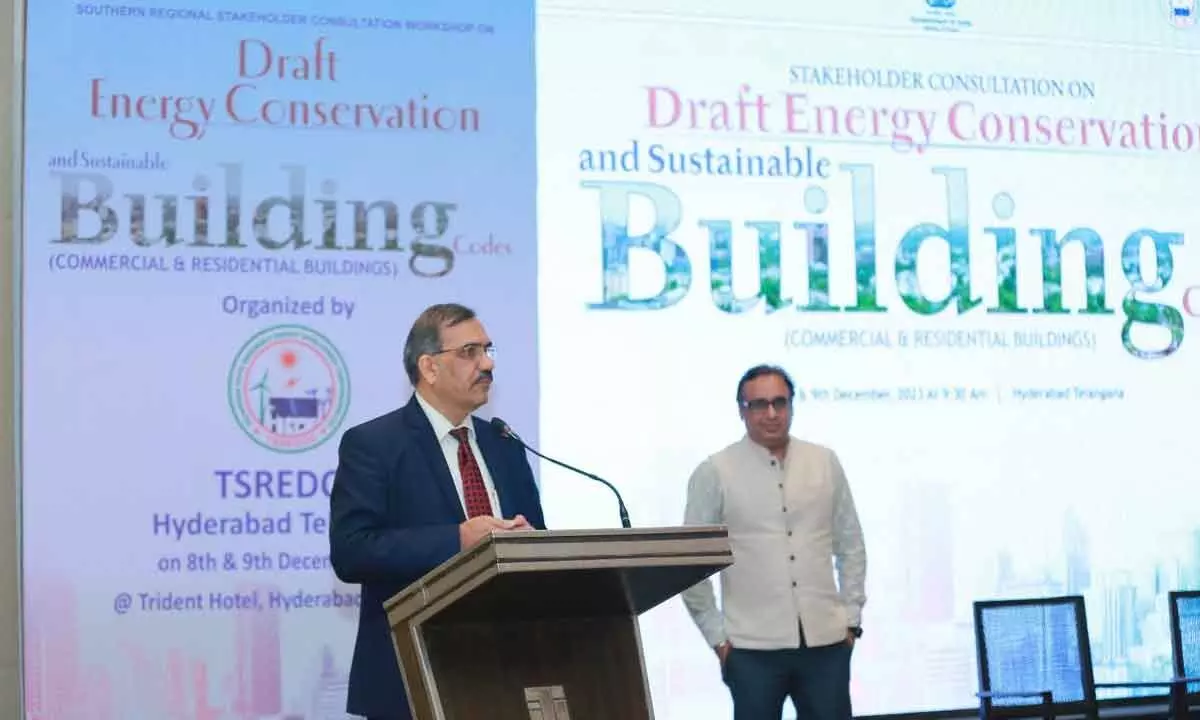AP, T’gana lead the way in sustainable building practice
Over 1,000 buildings now comply with the Energy Conservation and Sustainable Building Code (ECSBC) in these 2 States
image for illustrative purpose

Bureau of Energy Efficiency (BEE) said that Andhra Pradesh and Telangana have played a pivotal role in the implementation of Energy Conservation and Sustainable Building Code (ECSBC). Over 1,000 buildings in these two States are under compliance with more than 3,000 stakeholders trained in the same. The Super ECSBC building in Visakhapatnam is set for completion by January 2024. It aims for near-zero energy consumption, serving as a training institute and showcasing best practices.
The Union Ministry of Power-led BEE is on the verge of introducing ECSBC to redefine India’s construction practices by curbing carbon emissions, fostering economic growth, and promoting innovation in line with global environmental commitments.
While delivering key note address during two-day second Stakeholder Consultation in Hyderabad, Abhay Bhakre, Director General of BEE, stressed on the potential to save 50 per cent of energy demand in the building sector by 2030, equivalent to reducing 300 million tons of CO2 emissions. This aligns with India’s commitment under the Paris Agreement and Sustainable Development Goals, targeting a 33-35 per cent reduction in emission intensity by 2030 and a 40 per cent share of non-fossil fuels in the electricity mix.
As part of the evolution, the Energy Conservation Act has been amended, leading to the revision of the Energy Conservation Building Code (ECBC) to ECSBC, emphasising the importance of sustainability features. The code stimulates the demand and supply of energy-efficient products and services, ranging from insulation, lighting, HVAC, solar, to smart meters.
The impending ECSBC will establish minimum energy performance standards for new commercial and residential buildings, taking a holistic approach to sustainability beyond emissions reduction. Recognising the substantial impact of buildings on global energy consumption and carbon footprint, India is committed to environmental responsibility, positioning ECSBC as a cornerstone of its efforts, Bhakre said.
ECSBC’s implementation will involve a comprehensive stakeholder consultation process, engaging various parties to ensure a well-rounded perspective and enhance the codes relevance and acceptability. The second Stakeholder Consultation in Hyderabad was pivotal in soliciting valuable inputs for formulating ECSBC, he added.
Abhay Bhakre appreciated the efforts of Spl CS Energy, K Vijayanand, and CMD Eastern Power Distribution Company (EPDCL), Prudwi Tej, for their concerted efforts to construct the Super ECBC Building in Vizag. This was done in coordination with APSECM and the financial support of BEE.
Attending the Conference virtually, Prudwi Tej disclosed after the completion of construction of Super ECBC Building by January 2024, EPDCL will not only be able to save around 50 per cent of energy but also showcase it to other parts of the country.
Saurabh Diddi, Director at BEE, CEO’ s of AP and Telangana State designated agencies, Kumar Reddy, Janauah , BEE Sr Officer Meenaakshi Menon and stakeholders from building sector were also present.

